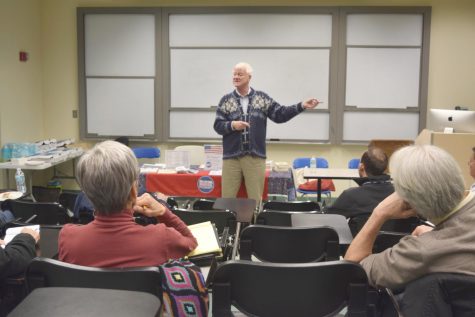George Lakey holds lecture on polarization
Activist George Lakey visited Wilkes University on Oct. 4 from 4 to 6 p.m. in Breiseth Hall. He discussed his experience with long-term social movement campaigns and social justice.
Lakey is a sociologist and an academic who has participated in activism for over six decades. He is from Bangor, Pa. and graduated from Cheyney University in southeastern Pennsylvania. He also studied at the University of Oslo, Norway, and taught at an Oslo high school. He continued his sociology studies at the University of Pennsylvania.
“He has great information on how we can all become involved in changing our society to be more just and inclusive for everyone,” said Notartomasco, co-leader of the Luzerne country chapter of Action Together NEPA. “George, with his over six decades of experience in standing up for what is right, will give us his thoughts and share his experiences on community building and how to use the increased awareness of citizens today for lasting change.”
Lakey’s lecture focused on polarization. Over one hundred years ago, Scandinavia was in a poor position economically, and he wanted to understand how it managed to turn itself around. The answer was polarization.
According to Paul DiMaggio in the American Journal of Sociology, “Polarization is both a state and a process. Polarization as a state refers to the extent to which opinions on an issue are opposed in relation to some theoretical maximum. Polarization as a process refers to the increase in such opposition over time.”
Lakey compared the sociological term of polarization to the mending of metal.
“Metal is stubborn. You need to heat it up to make it work. That’s polarization. It makes society malleable,” he said.
The period of shift in Scandinavia was in the 1920s-30s, the same period where it had its greatest amount of polarization. During this time, Germany and Italy were also in a period of polarization.
“It doesn’t guarantee good change, just lots of change. It definitely means violence. We should use it for our own purposes rather than fascism or Nazism,” he said.
The United States is currently in a period of polarization. According to Lakey, people need to fully expect things to get more volatile, however, this brings the biggest opportunity for positive or negative change. After all, the greater the polarization, the greater the economic inequality.
Norway had a nonviolent revolution, as they had witnessed the Russian Civil War and did not want to have the issues that came along with the war.
Instead, they did boycotts, which in itself was impressive because the shipping industry had been in dominance for centuries. The Nordic economic elite called in the military at an unarmed protest, where they opened fire at protestors. Eventually, egalitarian policies were passed that are still in effect today.
According to Lakey, numerous people believe the US is too big or too individualistic to implement Scandinavian policies, however, he noted that Norway was pragmatic and took inspiration from countries like China. They looked at what worked somewhere else and tried to see if it worked for them, testing it at the state level and then working its way up.
“The advantage we have over the Nordics is that we already had a civil rights movement. The Nordics didn’t. They had to invent it as they went,” he said.
The greatest opportunity to promote change during periods of great polarization and economic inequality is to create a campaign against something that people want to change. They need to identify the opponent and then they need to determine who will be the ones who deliver that change.
He used the example of a group of four African-Americans in Greensboro, NC during the civil rights movement. They sat at a “white’s only” counter and asked for coffee. It was not a 15-minute one-off demonstration. They continued to do it until it spread to surrounding communities. It was one of the most iconic nonviolent protests during the movement.

Lakey explaining the nature of effective and ineffective protests, including an analysis of the Greensboro sit-ins.
In the 1950s, Lakey participated in the ban-the-bomb movement and was later arrested at a sit-in during the civil rights movement. In 1966, he co-founded the national body A Quaker Action Group (AQAG), where he participated in the protest action in South Vietnam seeking to give medical supplies to the anti-war Buddhist movement there.
In 2009, Lakey co-founded the Earth Quaker Action Team (EQAT), to build a just and sustainable economy through nonviolent direct action campaigns. Lakey was arrested during its first campaign, but they succeeded in forcing PNC Bank to stop financing mountaintop removal coal mining in the Appalachia region.
He has written numerous books, with the two most referenced during his lecture being: “How We Win: A Guide to Nonviolent Direct Action Campaigning” and “Viking Economics: How the Scandinavians got it right and how we can, too.”
Parker Dorsey is a senior communications studies major with a concentration in strategic communications. Parker began as a staff writer for the opinion...